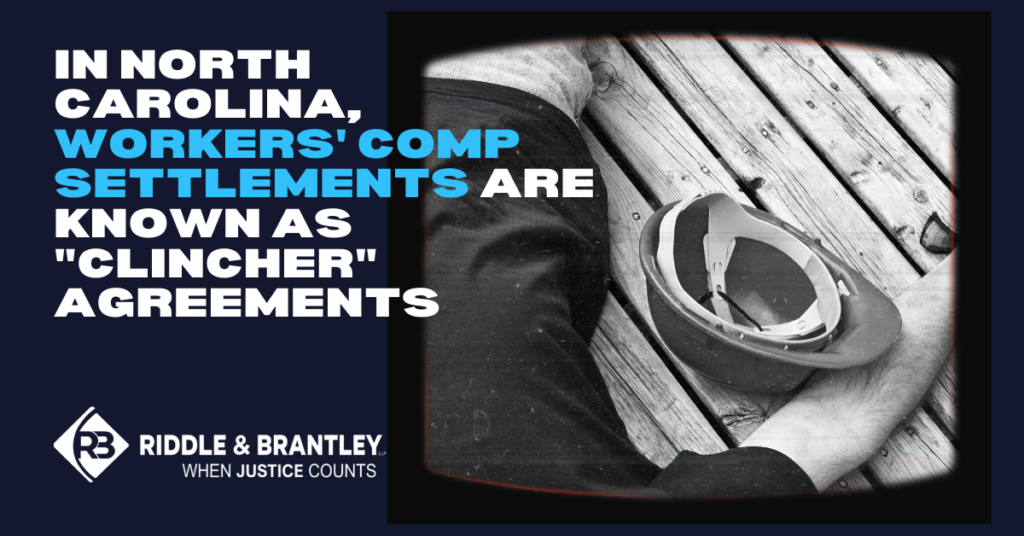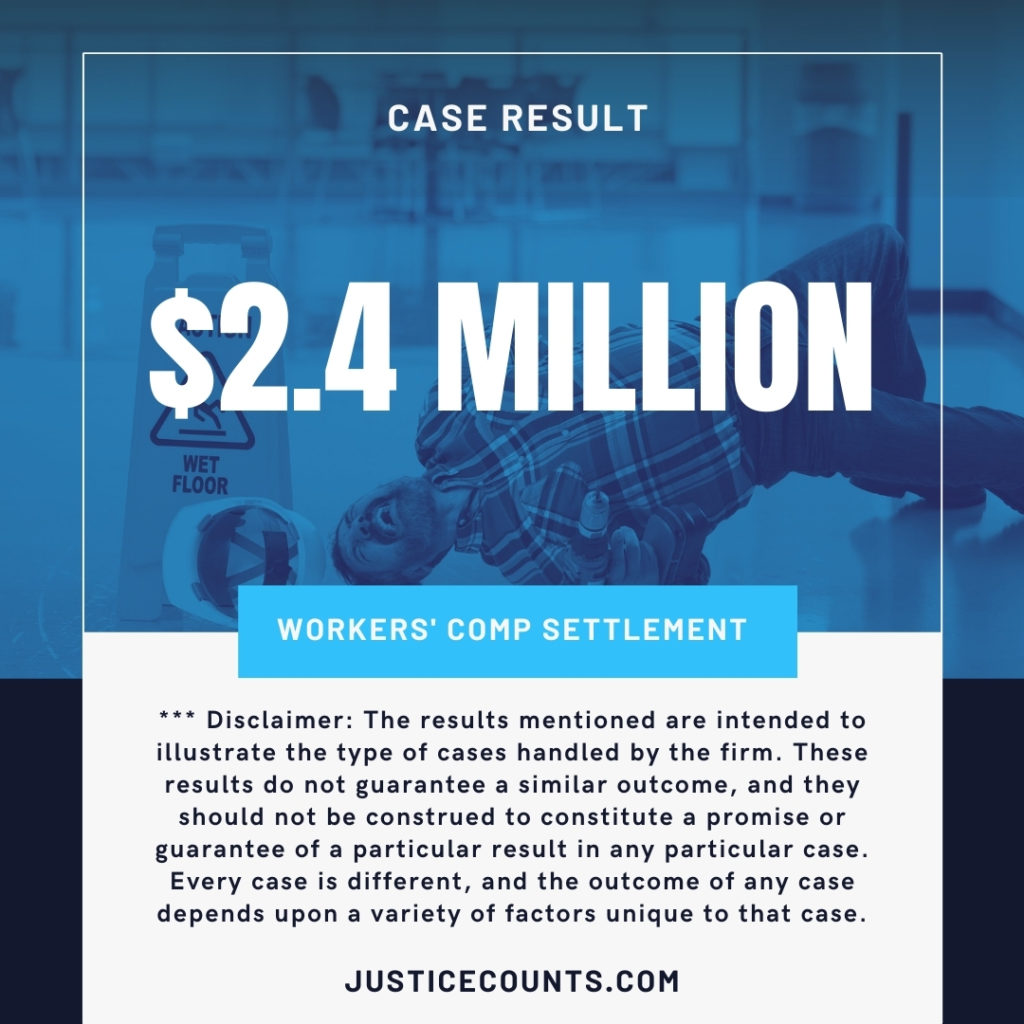North Carolina Workers’ Compensation Settlements
Wondering how workers’ comp settlements work in North Carolina? Our workers’ compensation attorneys have what you need to know (for more detailed information on other workers’ comp topics, don’t miss our workers’ compensation FAQ page, as well).
Workers’ Comp vs. Personal Injury Settlements
When most people think about settlements of personal injury claims, they think about settlements in civil claims. In civil claims or civil lawsuits, you are usually talking about reaching a settlement that involves payment of your medical expenses and wage losses, and compensation for your pain and suffering. In civil claims, the process is very different from in worker’s compensation claims.
So, for example, if you have been in a motor vehicle accident in North Carolina, you will usually go to whatever doctor you choose. You might use your health insurance to help pay for your care. The liability insurance for the driver who caused the accident will not tell you what doctor to go to. Nor will they pay for that medical care. They also will not pay you for your time out of work or for your suffering until you reach a total settlement at the end of your care. Settlements in personal injury claims can be significant because they involve pain and suffering, but the downside is that you do not receive any money until you settle your case. And you typically won’t want to settle your case until you are done treating and fully recovered from your injuries.
“How Do Workers' Comp Settlements Work?"

In worker’s compensation claims, the process is very different. In workers’ comp claims, the insurance company will pay for your doctor, but they will also direct you to the doctors they want you to treat with. They will pay you 2/3 of your wages for the time you are out of work, but they will pay you while you are out of work, not after you are done treating. In worker’s compensation claims, you do not get paid for pain and suffering.
Because worker’s compensation claims and civil personal injury claims are so different, settlements are also very different. In a typical worker’s compensation claim, where the insurance company has been paying you for your time out of work and paying for your medical care, you do not need to pay medical expenses out of a settlement. So… a settlement amount in a work comp claim is based on prospective loses. That is to say, a workers’ compensation settlement is meant to compensate you for future losses, including medical expenses and time out of work that you have not yet suffered.
Workers’ Compensation and Future Losses
Since you are not entitled to pain and suffering damages in workers’ compensation claims, the insurance company will not value your claim based on what you have been through. They will value your claim, and offer you settlements, based on the future losses you have not yet experienced.
Workers' Compensation Settlement Agreements
North Carolina workers’ compensation attorneys commonly refer to settlement agreements as “clincher agreements.” The term is a slang or short-hand term, so if you start reviewing actual statutes or appellate decisions, you won’t see much or any mention of the term, since the formal name for such an agreement is a “compromise settlement agreement.”

So people always ask us, “What is my case worth if I settle my case?” Well, that is a hard question because under North Carolina’s workers’ compensation laws, clinchers are not required, and indeed, were not even contemplated when the statutes were originally drafted.
The workers’ compensation system was designed to provide a safety net to people who are hurt on the job. Injured workers are supposed to get quick access to reasonable care. They are entitled to receive weekly temporary total indemnity payments as replacement for wages or salary they miss while out of work. They can even be entitled to re-education and retraining services or other vocational assistance to help them locate new employment.
But the worker’s compensation system IS NOT designed to pay an injured worker a large lump sum payment for what they have gone through. Workers’ comp does not compensate for pain and suffering. An injured worker is not entitled to a jury. An injured worker can never stand in front of a judge or jury and ask them to award him a settlement for what he has been through.
Rating Payments
An injured worker can also be entitled to a rating payment. Typically, toward the end of his or her recovery, an injured worker will be assigned a Permanent Partial Impairment Rating. And that rating can entitle the claimant to some amount of money. But those rating payments are usually very modest, and often it is not wise for the claimant to even elect to receive those payments if the injured worker has not yet returned to work. But you can elect to receive your rating payment and leave open your claim for medical care.
When you hear about people who got big payouts as part of a workers’ compensation settlement, those payments are almost certainly the result of a clincher agreement. In a clincher, the injured worker and the employer and/or insurance company for the employer usually are agreeing to a full and final buyout of the entire claim. As part of such a settlement, the injured worker typically waives his rights to everything under the Workers’ Compensation Act: weekly disability checks, medical care, etc. The injured worker usually also has to resign his employment from the company, and agree not to reapply to the company in the future.
How Are Settlement Agreements Calculated?
There is no set way to calculate what amount a case should settle (or, "clincher") for. In effect, a workers' compensation settlement is a divorce. And the amount agreed to by the parties is simply the amount that both sides agree as the price that makes it worthwhile for both sides to walk away from the claim and buy that divorce. The injured worker gets a lump sum payment, but in exchange, he gives up his job, and must find a new way to make a living and obtain any additional medical care he might need in the future. The employer and the insurance company have to cut a large settlement check, and in exchange they achieve cost certainty and no longer have to worry about paying the injured worker over the next months or years.
“Should I Accept a Settlement in My Work Injury Case?"
In some instances, it is best for both sides to settle a claim by clincher. If the injured worker wants to see doctors of his own choosing, and has access to health insurance, a clincher can be a good idea. If the injured worker wants to take a lump sum payment and start his or her own business, then a clincher can be a jump start on a new chapter of life. But of course, the price has to be right.
We Can Help with Your Workers’ Compensation Settlement

If you or a loved one is thinking about settling a workers’ compensation claim, we strongly encourage you to retain an attorney who is experienced in negotiating settlements in such claims, to ensure you get the maximum amount you can possibly obtain.
At Riddle & Brantley, our workers’ comp team is led by two Board-Certified Specialists who have been recognized by the North Carolina State Bar for their experi9ence and expertise handling these claims.
Justice Counts for North Carolinians injured while on the job, and we would love to help however we can.
Call 1-800-525-7111 and let’s talk. You may be entitled to a workers’ comp settlement and we are ready to help.
*** Disclaimer: The results mentioned are intended to illustrate the type of cases handled by the firm. These results do not guarantee a similar outcome, and they should not be construed to constitute a promise or guarantee of a particular result in any particular case. Every case is different, and the outcome of any case depends upon a variety of factors unique to that case.